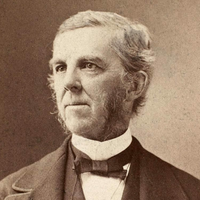Old Cambridge
AND can it be you’ve found a place
Within this consecrated space,
That makes so fine a show,
For one of Rip Van Winkle’s race?
And is it really so?
Who wants an old receipted bill?
Who fishes in the Frog-pond still?
Who digs last year’s potato hill?—
That’s what he’d like to know!
And were it any spot on earth
Save this dear home that gave him birth
Some scores of years ago,
He had not come to spoil your mirth
And chill your festive glow;
But round his baby-nest he strays,
With tearful eye the scene surveys,
His heart unchanged by changing days,
That’s what he’d have you know.
Can you whose eyes not yet are dim
Live o’er the buried past with him,
And see the roses blow
When white-haired men were Joe and Jim
Untouched by winter’s snow?
Or roll the years back one by one
As Judah’s monarch backed the sun,
And see the century just begun?—
That’s what he’d like to know!
I come, but as the swallow dips,
Just touching with her feather-tips
The shining wave below,
To sit with pleasure-murmuring lips
And listen to the flow
Of Elmwood’s sparkling Hippocrene,
To tread once more my native green,
To sigh unheard, to smile unseen,—
That’s what I’d have you know.
But since the common lot I’ve shared
(We all are sitting ‘unprepared,’
Like culprits in a row,
Whose heads are down, whose necks are bared
To wait the headsman’s blow),
I’d like to shift my task to you,
By asking just a thing or two
About the good old times I knew,—
Here’s what I want to know.
The yellow meetin’ house—can you tell
Just where it stood before it fell
Prey of the vandal foe,—
Our dear old temple, loved so well,
By ruthless hands laid low?
Where, tell me, was the Deacon’s pew?
Whose hair was braided in a queue?
(For there were pig-tails not a few,)—
That’s what I’d like to know.
The bell—can you recall its clang?
And how the seats would slam and bang?
The voices high and low?
The basso’s trump before he sang?
The viol and its bow?
Where was it old Judge Winthrop sat?
Who wore the last three-cornered hat?
Was Israel Porter lean or fat?—
That’s what I’d like to know.
Tell where the market used to be
That stood beside the murdered tree?
Whose dog to church would go?
Old Marcus Reemie, who was he?
Who were the brothers Snow?
Does not your memory slightly fail
About that great September gale?—
Whereof one told a moving tale,
As Cambridge boys should know.
When Cambridge was a simple town,
Say just when Deacon William Brown
(Last door in yonder row),
For honest silver counted down,
His groceries would bestow?—
For those were days when money meant
Something that jingled as you went,—
No hybrid like the nickel cent,
I’d have you all to know,
But quarter, ninepence, pistareen,
And fourpence hapennies in between,
All metal fit to show,
Instead of rags in stagnant green,
The scum of debts we owe;
How sad to think such stuff should be
Our Wendell’s cure-all recipe,—
Not Wendell H., but Wendell P.,—
The one you all must know!
I question—but you answer not—
Dear me! and have I quite forgot
How fivescore years ago,
Just on this very blessed spot,
The summer leaves below,
Before his homespun ranks arrayed
In green New England’s elmbough shade
The great Virginian drew the blade
King George full soon should know!
O George the Third! you found it true
Our George was more than double you,
For nature made him so.
Not much an empire’s crown can do
If brains are scant and slow,—
Ah, not like that his laurel crown
Whose presence gilded with renown
Our brave old Academic town,
As all her children know!
So here we meet with loud acclaim
To tell mankind that here he came,
With hearts that throb and glow;
Ours is a portion of his fame
Our trumpets needs must blow!
On yonder hill the Lion fell,
But here was chipped the eagle’s shell,—
That little hatchet did it well,
As all the world shall know!


